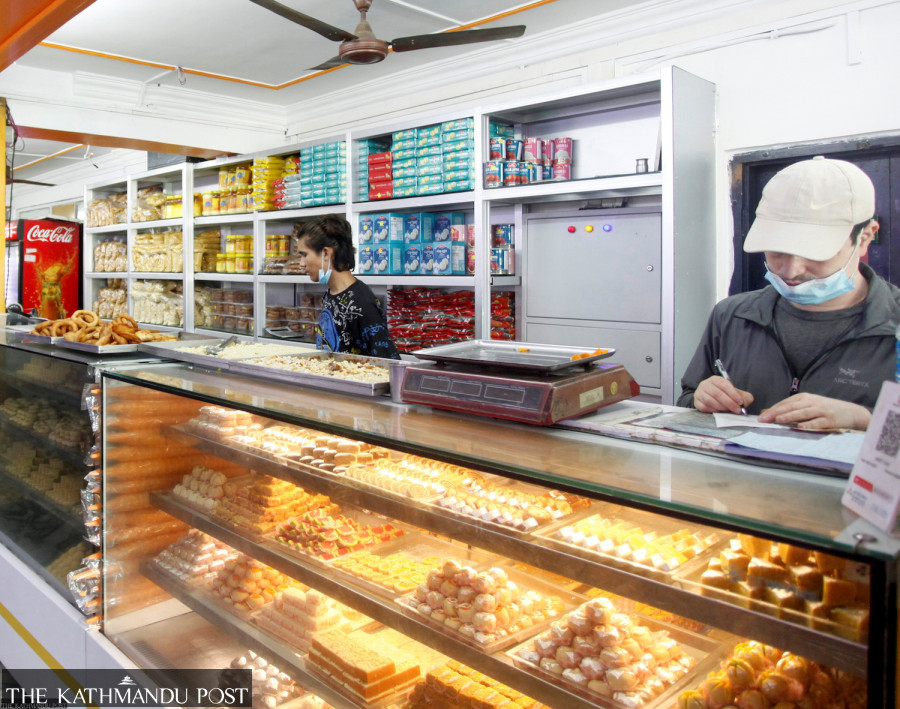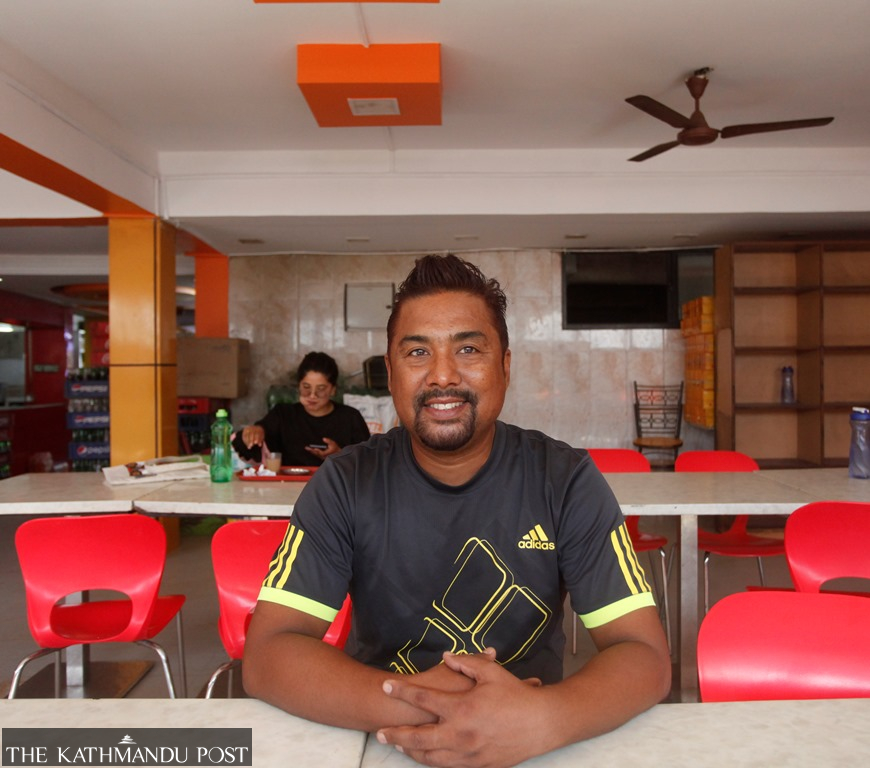Culture & Lifestyle
Sweet Cave: Jeevan Daiya Pasa, Kalimati's go-to fast food outlet
At this four-decade-old institution, politics and food blend seamlessly, like how it has always been.
Srizu Bajracharya
In the hustle and bustle of Kalimati, there are several famous landmarks. But perhaps the most famous is the Kalimati Tarkari Bazaar. A five-minute walk from the bazaar is possibly the area’s most famous fast food outlet: ‘Sweet Cave: Jeevan Daiya Pasa’.
In the mornings, the outlet is teeming with people sipping cups of steaming tea and having breakfast after finishing their morning walks. During lunchtime in the afternoons, office workers throng the cafe and from the kitchen, waiters carry plates of momos, chow mein, and dosas to the tables. And in the evenings, the pace slows down and the majority of customers are those coming to buy sweets.
Residents familiar with the area’s history tell tales of how integral Sweet Cave is to Kalimati’s recent history: The outlet opened in 1981, making it not only one of the oldest food outlets in the area but also a witness to how Kalimati, which is one of the busiest parts of Kathmandu, has evolved over the years.
On a recent morning at the outlet, seventy-four-year-old Uttam Lal Joshi, a retired tax officer, was reading the day’s newspaper and at his side was a cup of tea. Occasionally, he looked around to see the goings-on of his neighbourhood and waved hellos to his friends popping by to get their morning breakfast at the outlet.
“I go for a walk around the neighbourhood from Tahachal Bagaicha (at the northwest of Kalimati) at daylight every day and come to have my morning tea here. It’s become a ritual now. Here I get to meet people and know the how-about of my friends and families,” says Joshi, beaming with a jovial smile. “I have been coming here for more than 34 years. To me, this place is like a neighbourhood friend that I can always rely on. I have seen this place grow over the years. Of course, it is not what it used to be. The menu today is much more diverse and the layout of the place has changed, too. But despite all the changes, I can assure you that many people genuinely feel and appreciate the importance of this place. For many old-timers like me, Sweet Cave has become a habit.”
Joshi used to be friends with the founder of Sweet Cave the late Jeevan Raj Manandhar, who was inspired to start the business after seeing his maternal family’s tea and sweet restaurant in Om Bahal.
In the 80s, the outlet was popularly known as ‘Jeevan daiya Pasa’, meaning ‘Jeevan dai’s shop’ in Nepalbhasa. Manandhar was active in politics and his political ideology leaned left. His chiya-mari pasa (tea and sweets shop) was a junction where he met and hung around with people, sometimes to discuss the neighbourhood’s development, and at other times to discuss politics. During the Panchayat era, this was also where underground politicians like KP Oli, Madan Bhandari, and Bidhya Bhandari came for their political meetings. In the late 80s, Manandhar also became the chairperson of Ward 13.
Today, Manadhar’s son, Suman Sayami, owns and runs the outlet. And after years of running a business that’s embedded so deeply in the social fabric of the local community, Sayami has left his own mark not just in the business but also in the community.
Sayami starts work early. Every morning after a game of badminton with his neighbourhood friends, Sayami makes his way to one of Sweet Cave’s godowns, where he notes down the day’s bulk orders. The godowns are all stacked with lakhamaris, anarsa, dalmut, and furandana. Whether he is talking to his customers over the phone or in person, Sayami, no matter how busy he is, is always very genial and patient.
“You would think it’s the good food that prompts our customers to frequent this place—and it could be the case—but ultimately, it’s the way we make them feel that keeps them coming back. That is what I tell my staff all the time—haste does not beget business,” he says.
His friendly nature has made Sayami a popular figure among the restaurant’s regular customers, just like his father was. When customers need to make bulk orders for traditional sweets, which are integral to Newa rituals and ceremonies and want to negotiate prices, it is Sayami they prefer to deal with. Sayami knows this and thus it’s his phone number that is imprinted on Sweet Cave’s packaging and hoarding boards. As a result, his phone never stops ringing.
Sayami was studying in grade 7 when he joined his father’s business. “By the time I finished my schooling, I knew that I had to look after this business and expand it. Running the business felt like my calling, so I didn’t even think of pursuing higher studies. Instead, I worked hard on understanding how to run the business and dedicated myself to understanding each and every aspect of it,” he says.

By the early 2000s, Sayami had taken over the management of the business, and he was already leaving his own imprints on it. He introduced Indian sweets, which were becoming increasingly popular among Valley denizens, on the menu. He also expanded the menu by including dishes that can be made and served quickly, thus turning the establishment into a vegetarian fast food outlet. He also extended the business by providing services for Newa Bhwey(feast).
“Times and customers’ demands were changing and I knew that we had to adapt and we did and we continue to do so,” says Sayami.
The changes Sayami and his family brought further popularised Sweet Cave and footfall as the outlet surged. But despite it all, for years Sweet Cave was losing money.
“Given the huge crowd our shop was seeing, people thought we were making a lot of money. But the truth was, we were losing money. We realised that many of our customers were taking advantage of the crowd and were leaving without paying,” he says. “Once we introduced a pay-first system, the situation improved.”
The city’s food and beverage industry has a high staff turnover rate, but many of Sweet Cave’s staff have been working at the establishment for years.
Thirty-one-year-old Ram Lal Yadav, who works as a cook at Sweet Cave, has been working at the outlet for 13 years.
“We get thousands of customers daily, and in the afternoons, which is when people stop for lunch and khaja, it becomes really hectic,” he says. “It’s challenging working at an establishment as busy as ours, but Sayami dai makes sure that we are well taken care of.”
Yadav starts every morning by making lalmohan and rasbari, and during festivals, which is when demands are high, Yadav reaches out to his friends who know how to make sweets to help in the kitchen.
“I understood a very long time ago that for any business to thrive, it’s crucial to take good care of employees. One of the key reasons our business has managed to come this far is because of our employees,” says Sayami.
One of the oldest members of the staff is Pasang Tamang. He joined Sweet Cave in 1990.
“Not only are the staff here paid well but Sayami dai also makes sure that our other needs are also well taken care of. I see no reason why I should leave this place. I am happy at work,” says Tamang.
But 48-year-old Sayami, who once spearheaded Sweet Cave, has taken a back seat, letting his family members and his staff take over the operation. The reason is his deepening engagement with social and political movements.
Sayami, besides being a businessman, is also well-known as a cultural activist who has actively taken part in movements that opposed the government’s road development plans in different communal neighbourhoods. This endeavour started about six years ago when his own home, among dozens, was about to be torn down during a road expansion drive in Kalimati. He has since raised his voice on behalf of communities in Thankot, Sankhu, Tokha, Balaju, Khokhana, and Harisiddhi that were facing the same problems.
“When my own home was at the risk of being demolished despite having the legal papers of our home, it shook me from within. That incident changed me as a person. After that, I held many meetings to make people aware of their rights as citizens and the consequences of road expansion, and many of those discussions happened here at Sweet Cave,” says Sayami. “But today, I have been so involved in helping communities that are at the risk of being uprooted because of the city’s road expansion drive that I no longer can dedicate as much time to my business as I used to. This social activism that I have been part of has made me see how in the name of development, the government is encroaching on our Newa community.”
The country, says Sayami, has not understood the meaning of development.
“Development is not exclusively about expanding roads and erecting tall buildings, it’s also about strengthening communities, preserving culture, and making people able. I see that politics has become more of a business and less of a platform to serve the people,” says Sayami.
Sayami’s social activism journey seems to be leading him on a path similar to his father’s. But he is quick to point out that he never intended to go down this road.
“I always saw myself as a businessman, but circumstances led me to get actively involved in social activism, and I now realise how important this is,” says Sayami, who says he is now open to entering mainstream politics. “But Sweet Cave will always be my base and I will continue to be involved in it.”
At around 11 am that recent morning, Sayami had already left the outlet to attend one of the day’s many social meetings. At the outlet, it was business as usual. Customers poured in and out of the outlet, orders for food, sweets and teas were placed and delivered, like how it has always been for decades. Seated at one of the tables was Joshi, the retired tax officer. He was drinking his second cup of tea and was lost in conversation with an old friend.




 22.51°C Kathmandu
22.51°C Kathmandu












.jpg&w=300&height=200)

